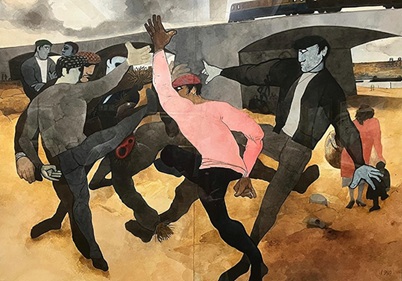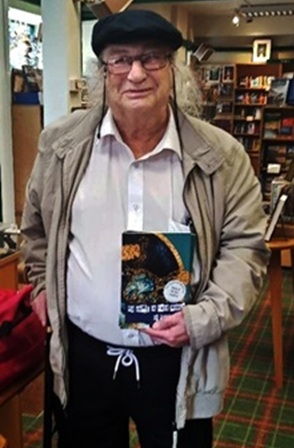
Star Story: Serendipity
July 1988
It’s mid-afternoon on a Saturday, the weather is warm and the centre of this Midlands city is busy with people enjoying the rare weekend sunshine. I am waiting at the bus stop on my way home.
I hear two people shout my name. I turn round and before I know what’s happening, I am on the ground, blood pouring out of my mouth and nose. I can smell the anger of the two men standing over me and I curl into the foetal position as they kick me while swearing homophobic abuse.
No-one intervenes as time seems to stand still. Perhaps passers-by don't want to get involved in something they think is none of their business or perhaps they’re worried the two men may turn on them.

I flinch, expecting more blows, but after one more round of verbals, they spit at me and walk away. It's all over in a few seconds, but my memory sees it all in slow motion.
Carefully and slowly, I raise myself from the concrete pavement slab and look around, reassuring myself they have gone. I take the bus that passes the general hospital. At first I don't think the driver is going to let me on, but he just stares at me, his lips curled in disgust, as I pay my fare. Some of the passengers look at me like I'm a piece of dirt that needs removing from their shoes.
As my brain registers what has happened and as the pain begins to hit me, my hands start to shake and when I stand up at the hospital stop, it is only will-power that prevents me falling over. It takes great effort to get my trembling legs to move. I can't breathe through my nose and it is painful to breathe through my mouth.
As I make my way to the hospital, I catch a glimpse of myself in a window and understand why people stare: a crust of blood and mucus blocks my nostrils, my lips are cut and swollen, one eye is almost closed and my face is bruised and bloodied. The pain is getting worse.
I stumble into A&E, weaving like a drunk, and at first the staff treat me as if I'd fallen over after too much booze. When I explain, as best I can through my bloodied mouth and swollen lips, that I've been beaten up because I’m gay, the nurse and doctor look at each other. Crinkling her nose as if she has smelled something disgusting, the nurse asks if they need to implement AIDS protocols.
After an examination, they tell me there is no serious or long-lasting damage, patch me up and send me on my way, suggesting I keep out of trouble in the future.
I know one of the men who attacked me, so I report the assault to the police. I get no sympathy, with the officer who takes my statement asking me what I've done to provoke them.
Nonetheless, they do arrest him and several months later, he pleads guilty to assault and is fined, but not before he tells the court that I was attempting to molest him. He also claims he was the only one who attacked me. Because he pleads guilty, I don’t have an opportunity to challenge his lies.
I am lucky: it could have been so much worse. Within a few weeks the black eyes, bruised face and body and swollen lips have gone, but the mental scars take much longer to heal. For the rest of the time I live in that city, I always carry a personal alarm whenever I leave home.
March 1990
Over eighteen months have passed since that assault. Winter is slowly releasing its grip as February turns into March, but there is still time for its icy hand to grab us one last time. Fear has gradually relaxed its hold on me, but it remains a constant companion. Whenever I leave home, I check my surroundings, make sure my personal alarm is in my pocket and I monitor any movement, treating everyone I see with suspicion.
It is dark as I approach the entrance to my favourite gay pub and, despite the streetlights, I don't see his face until it is too late to turn back. It is the assailant who wasn't prosecuted. He grabs the collar of my coat, pulls me towards him and, grinning, whispers: 'We'll be waiting for you when you leave.' He lets go of me and I push my way through the group lingering and chatting outside the pub, none of whom have witnessed the scene.
Once inside, I order my usual pint of bitter. Because of my shaking hand, when I pay the money falls from my fist on to the counter. The barman asks me if I'm okay. I nod. I scan the familiar surroundings. The reason I like this place is because it really is just an ordinary pub and lacks the loud mind-numbing disco music and headache-inducing flashing lights so common in gay venues.
Among the crowd are some friends of mine. I join them and they tell me that later they are planning to go to the local gay club. They ask me if I'd like to join them. I say yes, even though I dislike the club, which is noisy, even in the so-called quiet areas, has those ubiquitous flashing lights and non-stop disco, HiNrGy and electronic dance music. But leaving the pub with a group would be safer than leaving alone.
When we leave, there is no sign of the person who threatened me. Whether it was a bluff or he got fed up waiting or he scarpered when he saw I was in a group, I can't say.
The club is every bit as loud as I remember. I plan to stay for one drink and then, hopefully safely, make my way home. Instead, as I wander around, I see in the distance a tall, attractive dark-haired man. Our eyes meet, we smile and we both weave our way across the dancefloor until we are together.
That man is now my husband and we have been together for 35 years and counting.
I suppose I have those queerbashers to thank for meeting the love of my life.

Kevin Crowe
Kevin Crowe is GAW's northernmost member, living in Thurso in Caithness.
He writes for local papers and online magazines, and contributed two stories to 'Flash Dances'.